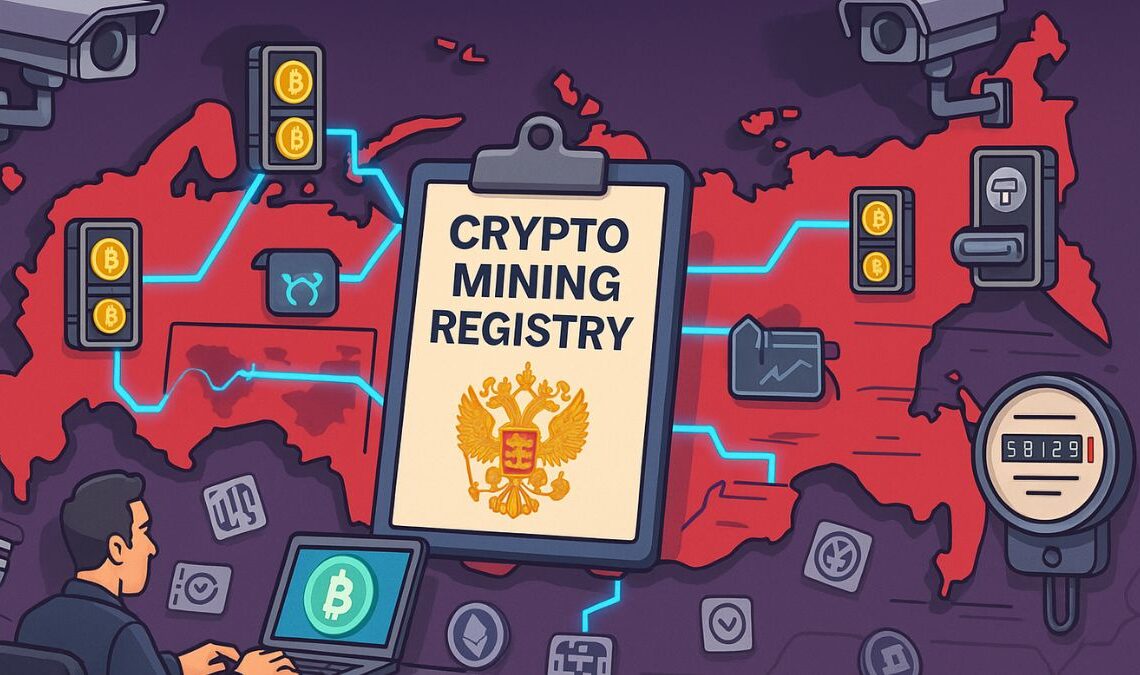Russia is formalizing its grip on the crypto mining industry by launching a crypto mining registry that aims to track all operational rigs within the country. The move, led by the Ministry of Energy and the Ministry of Finance, marks a significant step toward formal regulation of the sector, particularly as Russia seeks new ways to control energy consumption and boost wartime resilience.
According to local reports from RIA, miners across Russia will be required to register their equipment and disclose the location and power capacity of their mining rigs. This initiative is being implemented under a new framework that seeks to balance digital asset development with national security and energy stability.
Crypto Mining Registry Signals Tighter Oversight
The new crypto mining registry will serve as a centralized database to track hardware, operators, and energy usage—an effort the Russian government says is essential for “maintaining national energy integrity.” The registry comes as local governments across Russia grow increasingly concerned about blackouts and infrastructure strain caused by unregulated mining activity.
Notably, the Ministry of Finance is collaborating with Rosseti, the national power grid operator, to identify large-scale mining farms operating outside official channels. Unregistered miners could face disconnection or fines if they fail to comply with the registry initiative.
Strategic Timing Amid Geopolitical Tensions
The launch of the registry also aligns with heightened geopolitical and cybersecurity concerns. According to Bloomberg, Russia has seen a surge in regional internet blackouts as authorities clamp down on data traffic and infrastructure, part of a broader push to fortify digital sovereignty.
In this context, crypto mining—often linked to decentralized and borderless technologies—is being pulled closer to state control. The government sees mining as both a potential source of revenue and a strategic resource that must be brought in line with wartime protocols.
Industry Reaction and Future Implications
While some local miners have welcomed the move as a sign of formalization that could lead to eventual tax benefits or industrial recognition, others are wary. Many smaller operators fear that the crypto mining registry could be a precursor to heavy-handed taxation or sudden restrictions.
Russian mining associations have called for clear guidelines and incentives to prevent the exodus of mining operations to more crypto-friendly regions. They argue that without clarity on electricity rates, tax obligations, and long-term policy goals, the registry could backfire by pushing operations underground.
Still, experts believe the move is part of a broader pattern: governments worldwide are seeking to rein in the crypto sector through regulatory clarity and digital infrastructure tracking.
Final Thoughts: What the Crypto Mining Registry Means for Russia
The creation of Russia’s crypto mining registry marks a pivotal shift in how the country views digital asset infrastructure—not as a fringe sector, but as a strategic asset to be monitored and regulated. With energy grids under pressure and geopolitical tensions rising, mining in Russia is entering a new phase of state oversight.
As the registry rolls out in the coming months, all eyes will be on how the Kremlin balances economic opportunity with its growing appetite for control. For now, the message is clear: if you mine crypto in Russia, the government wants to know.










